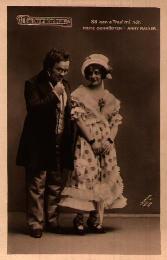Das Dreimäderlhaus
| Das Dreimäderlhaus or Blossom Time or Lilac Time |
|
|---|---|

Fritz Schrödter as Schubert and
Anny Rainer as Hannerl, 1916 |
|
| Music | Franz Schubert |
| Lyrics | Alfred Maria Willner Heinz Reichert |
| Book | Alfred Maria Willner Heinz Reichert |
| Basis | 1912 novel Schwammerl by Rudolf Hans Bartsch |
| Productions | 1916 Vienna 1916 Berlin 1921 Paris 1921 Broadway 1922 West End |
Das Dreimäderlhaus (House of the Three Girls), adapted into English-language versions as Blossom Time and Lilac Time, is a Viennese pastiche operetta with music by Franz Schubert, rearranged by Hungarian Heinrich Berté (1857–1924), and a libretto by Alfred Maria Willner and Heinz Reichert. The work gives a fictionalized account of Schubert's romantic life, and the story was adapted from the 1912 novel Schwammerl by Rudolf Hans Bartsch (1873–1952). Originally the score was mostly Berté, with just one piece of Schubert's ("Ungeduld" from Die schöne Müllerin), but the producers required Berté to discard his score and create a pasticcio of Schubert music.
The original production opened at the Raimundtheater in Vienna on 15 January 1916 and ran for over 650 performances in its original run in Austria and for hundreds more in Germany, followed by many successful revivals. It starred Fritz Schrödter as Schubert and Anny Rainer as Hannerl. Schrödter was already 60 in 1916. In 1886 he had sung the part of the "Prince of Song" (i.e. Schubert) in Franz von Suppé's operetta about Schubert. The operetta spawned a sequel entitled Hannerl. Debuting during World War I, the operetta's popularity was fueled by the public's taste for nostalgia, harnessing an old-fashioned, sentimental story and Schubert's familiar music. Schubert worked hard during his lifetime to become a successful opera composer but found little success in this genre of music. With Das Dreimäderlhaus, ironically, his music finally became famous in a stage work.
Das Dreimäderlhaus then premiered in Paris on May 7, 1921 in a French adaptation by Hugues Delorme and Léon Abric called Chanson d'amour (Song of Love). The operetta was a success in France, and soon an English language adaption opened on Broadway as Blossom Time, with a new arrangement of Schubert's music by Sigmund Romberg and an adapted libretto by Dorothy Donnelly. This debuted at the Ambassador Theatre on September 29, 1921, where it ran for 592 performances; it was revived several times on Broadway over the next two decades. In London, the operetta was called Lilac Time, with an adapted libretto by Adrian Ross and music arranged by George H. Clutsam, using some of Berté's work. Lilac Time opened at the Lyric Theatre on December 22, 1922 and ran for 626 performances. Both the Broadway and West End versions toured extensively in subsequent decades and were frequently revived until the 1950s.
...
Wikipedia
